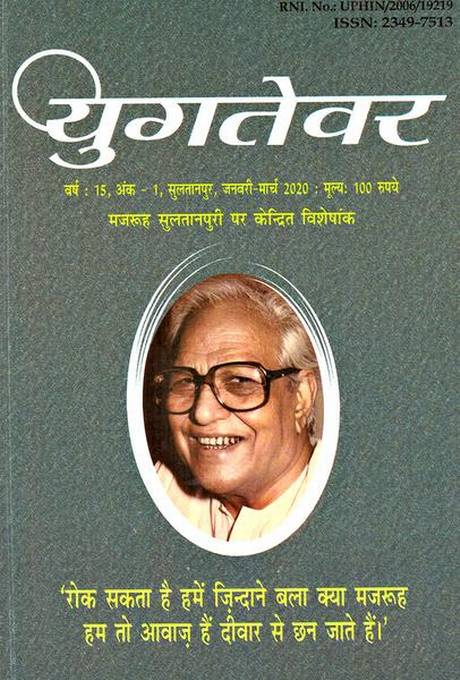Nizamabad Town (Azamgarh District) UTTAR PRADESH / Mumbai, MAHARASHTRA :
A committed communist, Majrooh Sultanpuri wrote about matters of love and freedom with equal conviction
Main akela hi chala tha janib-e-manzil magar
Log saath aate gaye aur karvan banta gaya
( I set out towards my destination all alone but people began to come along and a caravan was formed.)
With the exception of master poets like Mir Taqi ‘Mir’ or Mirza Ghalib, it seldom happens that an Urdu couplet becomes so popular and is quoted so often that it becomes part of everyday speech and people do not even remember the name of its creator. This is what happened to the above quoted couplet of Majrooh Sultanpuri whose enormous contribution to the Hindi film industry was acknowledged when he became the first lyricist to be decorated with the prestigious Dadasaheb Phalke Award in 1993. In 2013, a commemorative postal stamp was also issued on him.
Hindi literary journal Yugtevar has come out with a special number (January-March, 2020) on him to celebrate his life and work. It offers detailed information about the poet and contains critical appraisals and reminiscences written by, among others, top Urdu critics such as Prof. Shamim Hanfi, Urdu poets like Ali Sardar Jafri and Javed Akhtar, Hindi poets like Subhash Rai, and singers such as Lata Mangeshkar. A selection from his poetry has also been given in the concluding section of the journal.
Majrooh was born on the eve of Id as Asrar ul Hasan Khan in town Nizamabad that fell under police station Sarai Mir in Azamgarh district where his father Sirajul Haq Khan was posted as a police constable although his family belonged to village Ganjehdi near Sultanpur. There seems to be some confusion about the year of birth while the date is unanimously given as October 1. In his article, Akhtar Farooqui mentions 1918 as the year of Majrooh’s birth but Utkarsh Singh settles for 1919 while Rekhta website takes it back to 1915.
Asrar ul Hasan began writing poetry at an early age using the pen name ‘Naseh’ (religious preacher). As a young lad, he fell in love with a girl but failed to receive her affections. Soon, on the advice of his close friends, he became Majrooh (wounded) to the world and remained so until the end. Little wonder that his song “Jab dil hi toot gaya” in film Shahjehan remains hugely popular even now after more than 70 years. Initially, he wrote songs and lyrical song-like nazms but soon turned towards ghazal. As Prof. Shamim Hanfi recalls, in a creative life spanning nearly 60 years, he wrote only fifty odd ghazals and two notable nazms, besides penning more than two thousand film lyrics.
Traditional physician
Young Asrar ul Hasan studied Unani medicine to train as a traditional physician but he practised for only a few years as a Hakim appointed by Sultanpur District Board. He studied Arabic and Persian in Sultanpur and Tanda. While training to become a Unani hakim in Lucknow, he took admission in a music college to learn classical Hindustani music. However, his destiny was not to sing but to write songs for others to sing.
Top Urdu poet Jigar Muradabadi had noticed Majrooh’s talent and Majrooh too treated him as his ustad. He wrote that although Jigar never advised him on his ghazals, but he did shape his poetic temperament. Jigar Muradabadi was the uncrowned king of mushairas (poetic soirées) and he took Majrooh to Bombay (now Mumbai) in 1945 to take part in a mushaira where Majrooh proved to be a big hit. A R Kardar wanted Jigar to write songs for his film Shahjehan but Jigar recommended Majrooh’s name. Thus, the film lyricist was born. Perhaps, it it not common knowledge that Majrooh, whose mother tongue was Awadhi, wrote lyrics for a number of Bhojpuri films too and was a great success.
Impressive persona
It was during the Emergency when Majrooh Sultanpuri and Jaan Nisar Akhtar came to Jawaharlal Nehru University. Majrooh’s was a very impressive persona and he recited his ghazals in a tuneful but robust voice. And, fearlessly, he recited a ghazal that had shades of Kabir in it as it challenged the injustice and oppression. This couplet continues to resonate with me even today.
Sutoon-e-daar par rakhte chalo saron ke chiragh
Jahan talak ye sitam ki siyaah raat chale
(March ahead while placing the lamps of our heads on the opening of wounds till the dark night of oppression lasts.)
This was a poet who had spent two years in jail for reciting a poem at a mill union workers’ meeting in 1949 that harshly criticised the then prime minister Jawaharlal Nehru. A committed communist and member of the All India Progressive Writers’ Association (AIPWA), he followed the communist party’s line that held “Yeh aazadi jhoothi hai” (This freedom is false). The Maharashtra government slapped a case on him and asked him to seek forgiveness if he wanted to avoid jail.
Instead, Majrooh went underground and appeared in public in 1951 to attend a meeting organised to protest the arrests of Faiz Ahmed ‘Faiz’, Sajjad Zahir and others in Pakistan in the Rawalpindi Conspiracy Case. He was arrested after the meeting was over.
Majrooh breathed his last on May 24, 2000.
source: http://www.thehindu.com / The Hindu / Home> Books> Authors / by Kuldeep Kumar / February 20th, 2020









